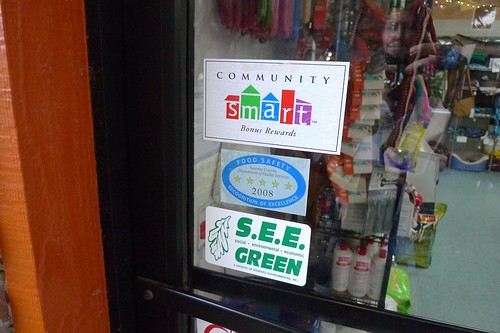While on a WE in the Russian River area, 2 hours north of San Francisco, my payment-obsessed eye noticed a “Community Smart Bonus Rewards” sticker on the entrance door of the Food for Humans organic supermarket.

Back home, I researched this program and found out that Community Smart Bonus Rewards is essentially a merchant-funded local fundraising program for local non-profits and community services like schools. Participating merchants set a rebate, participating customers choose a school or charity in their community that they would like to support, and for each qualifying transaction the cash value of the rebate minus a small administration fee is paid to the chosen school or charity. This reminded me a lot of Community Way, except that in Community Way, rebates are re-circulated as local currency, so they have a multiplier effect.
Merchants decide how to structure their rebates. The most common seems to be an amount or percentage based on a minimum purchase amount with an optional capped amount on each rebate, but many other options are possible:
- a flat dollar amount,
- a fixed percentage of the purchase amount,
- a tiered percentage of the purchase amount,
- an amount that is available on certain shopping days or promotional periods.
- a special percentage or amount (to override a normal percentage or amount) on certain shopping days or promotional periods.
Participation in the program only requires merchants to have a POS terminal, and only requires customers to have either a Community Smart-registered credit card, or a CommunitySmart program card (shipping/handling fee $4.95) for customers who wants to pay by cash or check.
When paying by cash or check, customers slide their CommunitySmart program card in the POS reader. Because the card is not a payment card the payment is declined, but the information about the purchase and the amount is recorded. This method of capturing customer transaction data by routine declining of authorization requests is the core patent of Nietech, the company supporting the Community Smart service.
Nietech is a Santa Rosa, CA-based company. According to this bizjournals.com report, their annual revenue is $750K. According to this article, they are a 14-people operation with among other customers, the Interra Project, a social commerce non-profit started by Dee Hock, founder of Visa International, and Greg Steltenpohl, founder of the Odwalla juice company with the goal to harness consumer power – 70 percent of the Gross National Product – for social change…
I haven’t had enough time to find much information about the current status and success of CommunitySmart or Interra. In 2005, Nietech reported having raised $75K for a local school in partnership with a local bank issuing their CommunitySmart card, but I haven’t found any news about a successful national roll-out. Similarly, Google News does not have much news about Interra Project in the last few years. I didn’t have much time to research and may have missed news, so if you have any information about these projects, please comment.
Excellent post. Thank you for sharing this.
Excellent post. Thank you for sharing this.